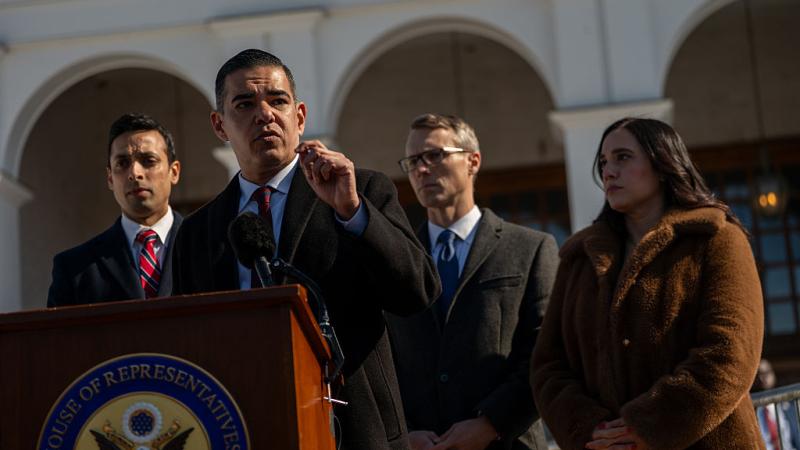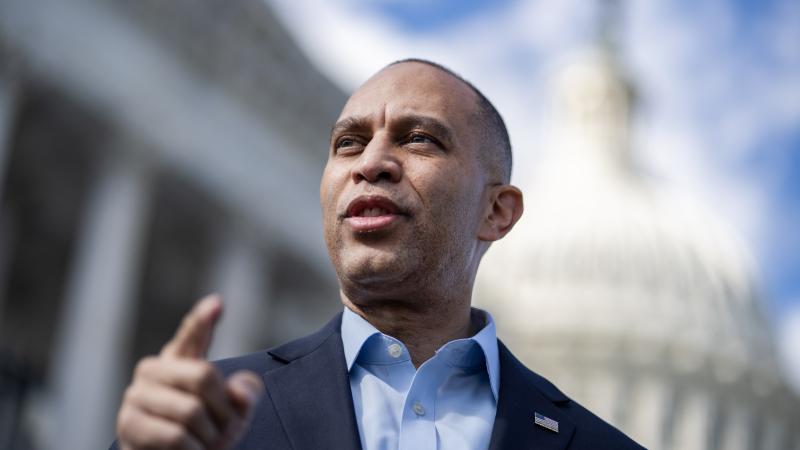PA congressman launches internal probe into role his office played in alternate electors flap
Rep. Mike Kelly initially denied any involvement but now is investigating.
Rep. Mike Kelly (R-Pa.) has launched an internal investigation in response to phone records and interviews showing a former top aide in his office played a role in a brief, abortive effort to forward a list of alternate electors to then-Vice President Mike Pence in the hours before the Jan. 6 Capitol riots.
The Pennsylvania Republican previously had denied his office or he had any role in the effort to solicit Sen. Ron Johnson to deliver names of alternate electors for Wisconsin and Michigan to Pence just before the vice president was to certify the results of the 2020 election at the Capitol.
Johnson ultimately decided not to deliver the materials, phone text messages show.
The phone records and interviews with three people with direct knowledge of the matter indicate that during the midday hours of Jan. 6, 2021 Johnson's Chief of Staff Sean Riley had contacts with former Kelly Chief of Staff Matt Stroia and an official from the Trump campaign.
The contacts involved an effort to retrieve the rosters of alternate electors from a postal facility in the Washington D.C. area and hand them to Pence, but it was foiled when Johnson's staff talked to the vice president's team and was asked not to deliver the materials, according to the interviews.
Pence's team already knew about the alternate electors, expected the relevant lists to arrive by mail and did not want them personally delivered at the Capitol because it would create security concerns for the Secret Service, which screens unopened mail sent to the VP, according to the interviews and text messages obtained by Just the News.
The individuals familiar with the effort said it was fleeting — lasting less than 90 minutes — and that Stroia was brought in simply because he was in Washington and the Trump campaign official was stuck in Georgia after volunteering to work for Republicans in Senate runoff elections on Jan. 5.
The new information corroborates the Wisconsin senator's account, which had been widely panned in the media late last month when Kelly denied his office had any role in the episode highlighted by the Democrat-led House Jan. 6 committee.
Kelly's office told Just the News it now has ordered an investigation into the role that Stroia, the lawmaker's former chief of staff, may have played in the episode.
"Our current chief-of-staff has begun conducting an internal investigation, which Rep. Kelly is aware of and takes seriously," said Matt Knoedler, the congressman's press secretary. "Kelly does not have knowledge of any potential conversations between Mr. Stroia and Sen. Johnson's staff related to the 2020 election."
Stroia, who left Kelly's office last year for the private sector, declined to talk on the record when contacted on his cell phone seeking comment.
The Democrats' House Jan. 6 committee sought to make a controversy out of the episode for Johnson, selectively leaking text messages and generating headlines that the Wisconsin senator tried to hand-deliver the alternate slates.
The full string of text messages, however, showed Johnson never attempted to deliver the slates. In fact, his chief of staff, Riley, recommended against it after a brief consultation with Pence, and the senator stood down.
When those text messages came out, officials said the request to Johnson originated with Rep. Kelly's office. Kelly then issued a statement denying any role in the request.
"Mr. Kelly has not spoken to Sen. Johnson for the better part of a decade, and he has no knowledge of the claims Mr. Johnson is making related to the 2020 election," his office said at the time.
A few days later in a local media interview, Kelly went further. Rhetorically questioning why somebody would "think a congressman from Pennsylvania would have anything to do with the election procedure in Wisconsin," Kelly said: "I haven't talked to [Johnson] about it, I haven't talked to any of his staff. I really have no understanding of what it is we're trying to get to there."
Kelly's office did not provide a timetable for the internal review to be wrapped up.
Johnson's minimal involvement in the episode began when a Wisconsin lawyer named Jim Troupis reached out to the senator asking for his help shortly before noon on Jan. 6.
"Need to get a document on Wisconsin electors to you the VP immediately," Troupis texted Johnson. "Is there a staff person I can talk to immediately. Thanks, Jim T."
Johnson asked Riley to find out what was going on, and the chief of staff reached out to a top Pence aide, Chris Hodgson, in text messages the committee selectively released.
"Johnson needs to hand something to VPOTUS," Riley texted Hodgson.
"What is it?" the VP's staffer inquired.
"Alternate slate of electors for MI and WI because archivists didn't receive them," Johnson's aide explained.
"Do not give that to him," Hodgson wrote back.
That's where the committee's release of text messages ended. But there was much more that the committee did not disclose.
The ensuing text messages show Pence's staff already knew about the alternate electors and expected them to be arriving by mail. And Johnson's staff immediately took the advice and stood down.
"He's about to walk over to preside over the joint session," Hodgson texted Riley, stressing he already knew about the electors. "Those were supposed to come in through the mail."
"I can do that,'' Riley said, clearly signaling he was standing down. "Anything else?"
"The VP absolutely should not receive any mail that hasn't been screened," Hodgson explained.
"Understood," Riley wrote back. "Johnson understands."
A few minutes later, the senator texted Troupis back that he was not going to deliver any such package.
"We have been informed the VP cannot accept any unsealed mail and I cannot hand it to him," the two-term senator wrote Troupis at 12:46 p.m., exactly 70 minutes after the effort began.
During that interval, Riley had two calls with the Trump campaign staffer and one with Stroia, phone records show. The calls involved an effort to get the alternate electors' names from the House side, where they had been retrieved from a postal facility, and to Johnson's office, according to the interviews.
While Riley got a copy of the slates, neither he nor Johnson nor anyone else in the senator’s office ever delivered them to Pence or his team, officials said.
















